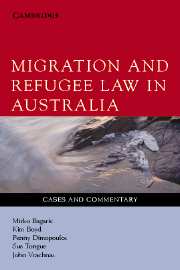Book contents
- Frontmatter
- Contents
- Detailed table of contents
- Table of cases
- Table of statutes
- 1 Thinking about migration law and national borders: An aspirational benchmark?
- 2 Introduction to Australian immigration law
- 3 Family and interdependency visas
- 4 Business and investment and skill-based visas
- 5 Temporary visas
- 6 Miscellaneous visas
- 7 Common visa requirements
- 8 Introduction to Australian refugee law: The Refugees Convention in Australian domestic law
- 9 Convention grounds
- 10 Persecution
- 11 Well-founded fear of persecution
- 12 Limits on protection of refugees: Cessation, exclusion exceptions and protection by another country
- 13 Cancellation of visas
- 14 Judicial review
- 15 Migration and human rights
- Index
3 - Family and interdependency visas
Published online by Cambridge University Press: 05 June 2012
- Frontmatter
- Contents
- Detailed table of contents
- Table of cases
- Table of statutes
- 1 Thinking about migration law and national borders: An aspirational benchmark?
- 2 Introduction to Australian immigration law
- 3 Family and interdependency visas
- 4 Business and investment and skill-based visas
- 5 Temporary visas
- 6 Miscellaneous visas
- 7 Common visa requirements
- 8 Introduction to Australian refugee law: The Refugees Convention in Australian domestic law
- 9 Convention grounds
- 10 Persecution
- 11 Well-founded fear of persecution
- 12 Limits on protection of refugees: Cessation, exclusion exceptions and protection by another country
- 13 Cancellation of visas
- 14 Judicial review
- 15 Migration and human rights
- Index
Summary
Overview
There are several categories of visas that allow for family migration. The visa applicant must be a relative (within a specified class) of the sponsor, or have an interdependent relationship with the sponsor. These visas can include members of the applicant's family unit. Typically, members of the applicant's family unit are not required to meet all criteria for a particular application. The primary criteria they must satisfy is that they are members of the family unit, and the secondary criteria is in the form of health and character requirements.
There are a number of sub-classes of family visas that are available to applicants that are overseas. The visas are:
spouse (100)
child (101)
adoption (102)
parent (103)
interdependency (110)
aged dependent relative (114)
remaining relative (115)
carer (116)
orphan relative (117)
designated parent (118)
contributory parent (143).
There are also visa categories for off-shore applicants who wish to marry or have married their spouse. Where the marriage is to occur after the applicant arrives in Australia, the relevant visa is the Prospective Marriage visa (300). Where the parties are already married at the time of application the relevant visa is the Spouse (Provisional) visa (309). There are also provisional visas for applications based on interdependent relationships – Interdependency (Provisional) (310) – that allow applicants to join their (normally same-sex) sponsor in Australia until the application for permanent residence is decided.
- Type
- Chapter
- Information
- Migration and Refugee Law in AustraliaCases and Commentary, pp. 56 - 91Publisher: Cambridge University PressPrint publication year: 2006



